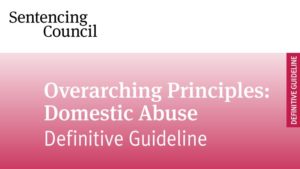All posts by Andrew Wesley/h3>
A new domestic abuse sentencing guideline was published on 22 February 2018, giving courts up to date guidance that emphasises the seriousness of offending involving domestic violence or other forms of abuse in a domestic setting.
What is domestic abuse?
There is no specific crime of domestic abuse. It can be a feature of many offences including assault, sexual offences or harassment. The new domestic abuse sentencing guideline aims to ensure that the seriousness of these offences is properly taken into account when such offences are being sentenced. The intention is that sufficient thought is also given to the need to address the offender’s behaviour and prevent re-offending.
Are there an existing domestic abuse sentencing guideline?
The new guideline replaces a domestic violence guideline which was published in 2006. A great deal has changed since then in terms of societal attitudes, expert thinking and terminology.
It was felt, therefore, that guidance for courts was therefore in need of revision to bring it up to date. ‘Domestic abuse’ is now the term used, rather than ‘domestic violence’. This reflects that offences can involve psychological, sexual, financial or emotional abuse as well as physical violence.
When is the new guideline in force?
The domestic abuse sentencing guideline will apply to all offenders aged 16 and older sentenced on or after 24 May 2018.
How does this guideline change things?
The guideline identifies the principles relevant to the sentencing of cases involving domestic abuse, outlines how the seriousness of offences should be assessed and highlights other factors that should be taken into account.
It brings a distinct change in emphasis in relation to seriousness.
The previous sentencing guideline stated that offences committed in a domestic context should be seen as no less serious than those in a non-domestic context, whereas the new guideline emphasises that the fact an offence took place in a domestic context makes it more serious.
This is because domestic abuse is rarely a one-off incident, it is likely to become increasingly frequent and more serious the longer it continues and may result in death. It can also lead to lasting trauma for victims and their children.
For the first time, the guideline also includes a reference to abuse which is perpetrated through use of technology, such as email or text, social networking sites or tracking devices fitted to a victim’s car. These are increasingly common methods by which domestic abuse can occur.
The guidelines recognise that these offences can affect people of all backgrounds and the guideline is also clear that abuse can occur between family members as well as between intimate partners.
Will anything else change?
Yes. In particular, there is now additional guidance on restraining orders, along with new guidance on Victim Personal Statements.
In relation to restraining orders, the guideline now includes additional guidance to assist the court with a renewed focus on keeping the victim safe, particularly for those who continue or resume their relationship with the offender.
The guideline further reminds courts to take any Victim Personal Statement into account. Where there is no such statement, this is not an indication of any lack of harm to the victim.
Sentencing Council member Jill Gramann said:
“Domestic abuse comes in many forms such as harassment, assault and sex offences. The increasing use of technology in offending has meant that it has also evolved in its scope and impact. The new guideline will ensure that courts have the information they need to deal with the great range of offending and help prevent further abuse occurring.”
What factors will a court take into account on sentence?
The following list of non-exhaustive aggravating and mitigating factors are of particular relevance to offences committed in a domestic context and should be considered alongside offence specific factors.
Aggravating Factors
- Abuse of trust and abuse of power
- Victim is particularly vulnerable. Although all victims of domestic abuse are potentially vulnerable due to the nature of the abuse, but some victims of domestic abuse may be more vulnerable than others, and not all vulnerabilities are immediately apparent)
- Steps taken to prevent the victim reporting an incident
- Steps taken to prevent the victim obtaining assistance
- Victim forced to leave home, or steps have to be taken to exclude the offender from the home to ensure the victim’s safety
- Impact on children as children can be adversely impacted by both direct and indirect exposure to domestic abuse
- Using contact arrangements with a child to instigate an offence
- A proven history of violence or threats by the offender in a domestic context
- A history of disobedience to court orders such as, but not limited to, Domestic Violence Protection Orders, non-molestation orders and restraining orders
Mitigating Factors
- Positive good character – as a general principle of sentencing, a court will take account of an offender’s positive good character. However, it is recognised that one of the factors that can allow domestic abuse to continue unnoticed for lengthy periods is the ability of the perpetrator to have a public and a private face. In respect of offences committed within a domestic context, an offender’s good character in relation to conduct outside these offences should generally be of no relevance where there is a proven pattern of behaviour
- Evidence of genuine recognition of the need for change, and evidence of obtaining help or treatment to effect that change
Will those convicted get a longer sentence?
A spokesperson for the Sentencing Council commented:
‘Overall, it is likely that there will be an increase in sentence severity as a result of the introduction of the guideline, however, the guideline emphasises the need to consider the most appropriate sentence to prevent further re-offending and protect victims, which may be a community order.’
How we can help
Many people feel that sentencing is increasingly a mechanistic process, with a danger that the new domestic abuse sentencing guideline will be rigidly stuck to, and the individual considerations of defendants either ignored or played down.
However, case law over the last few years emphasises that courts should be cautious to ensure that this does not happen. All of our advocates are experienced in presenting the best mitigation possible to courts, ensuring the best possible outcome.
A specific case study can be found here.
If you intend to fight your case at trial then we have a proven track record of securing not guilty verdicts. Examples can be found here and here.
Contact a specialist in defending domestic abuse cases
The new domestic abuse sentencing guideline mean that it may be easier in the future for courts to justify a custodial sentence. As a result, you will want to contact us as soon as the police make contact with you.
Your nearest office can be found here. We provide a nationwide service, 24 hours a day, 7 days a week. All advice and assistance in police interview will be free of charge to you. Legal aid is available for many cases before the Magistrates’ and Crown Courts.






